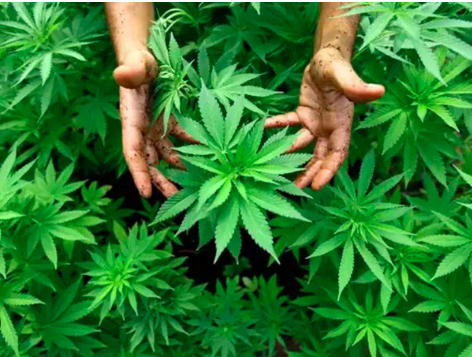Trending Stories
Marijuana Reclassification Puts Politics and Profits Ahead of Public Health

Marijuana Reclassification Puts Politics and Profits Ahead of Public Health
The Biden administration’s decision to reschedule marijuana from Schedule I to Schedule III has sparked significant controversy. While some hail it as a progressive step towards legalization, others argue that it prioritizes political and financial interests over public health. This article delves into the implications of this decision, examining its impact on public health, legal ramifications, and the underlying motivations.
Understanding Drug Schedules
What Are Drug Schedules?
The Controlled Substances Act classifies drugs into five schedules based on their potential for abuse and medical value. Schedule I, the most restrictive category, includes drugs with a high potential for abuse and no accepted medical use. Marijuana has been classified under Schedule I, alongside drugs like heroin and LSD.
The Proposed Reclassification
The Biden administration’s proposal to reclassify marijuana as a Schedule III substance suggests that it has a lower potential for abuse and recognized medical use. However, this shift does not equate to full legalization, nor does it address issues such as expunging criminal records or pardoning past offenders.
The Science Behind Marijuana
Medical Value of Marijuana
Marijuana consists of numerous cannabinoids, with THC being the primary psychoactive component. Despite some derivatives being approved for medical use, the marijuana plant itself has not been endorsed by the FDA for treating any disease. This lack of approval stems from the variability and lack of standardization in marijuana strains and consumption methods.
Health Risks and Concerns
The American Psychiatric Association and other medical bodies have voiced concerns about the health risks associated with marijuana. Studies indicate a significant link between marijuana use and increased risk of psychosis, especially with high-potency products. Additionally, the method of consumption—smoking—raises further health concerns.
Political and Financial Motivations
Election-Year Politics
Critics argue that the reclassification is politically motivated, aiming to garner support during election periods rather than being based on scientific evidence. The FDA’s use of an unconventional two-factor test to justify the reclassification has raised eyebrows, suggesting that the decision was driven more by political expediency than rigorous scientific review.
Financial Interests
The reclassification opens the door for profit-driven industries, including tobacco, alcohol, and pharmaceuticals, to invest in the burgeoning marijuana market. This commercialization could lead to an increase in highly potent marijuana products, further exacerbating public health concerns.
Implications of Reclassification
Public Health Impact
An increase in marijuana availability and use is likely to lead to a corresponding rise in misuse and related harms. States that have legalized marijuana have already seen an uptick in traffic fatalities, emergency room visits, and calls to poison control centers related to marijuana use.
Legal and Social Ramifications
While the reclassification does not legalize marijuana, it may influence public perception, leading more people to view the drug as harmless. This shift in perception could undermine public health efforts to educate people about the risks associated with marijuana use.
Finding a Middle Ground
Balanced Policy Approach
There is a need for a balanced approach that neither criminalizes nor commercializes marijuana excessively. Policies should aim to regulate marijuana in a way that minimizes harm while preventing the proliferation of highly potent and kid-friendly products.
Public Health Prioritization
Public health should be at the forefront of any policy changes regarding marijuana. This includes rigorous scientific research, public education, and the implementation of safety measures to protect vulnerable populations.
Conclusion
The Biden administration’s decision to reclassify marijuana as a Schedule III substance highlights the complex interplay between politics, profits, and public health. While it represents a significant shift in drug policy, it raises important questions about the motivations behind the decision and its potential impact on public health. A balanced approach that prioritizes public health and rigorous scientific evaluation is essential as we navigate this evolving landscape.
FAQs
1. What does it mean to reclassify marijuana to Schedule III?
Reclassifying marijuana to Schedule III suggests it has a lower potential for abuse and recognized medical use, but it does not equate to legalization.
2. Will the reclassification of marijuana lead to the release of prisoners?
No, the reclassification does not automatically lead to the release of prisoners or the expungement of criminal records related to marijuana offenses.
3. What are the health risks associated with marijuana use?
Marijuana use is linked to an increased risk of psychosis, particularly with high-potency products, and can result in various health issues when smoked.
4. How does the reclassification impact public perception of marijuana?
The reclassification may lead more people to view marijuana as harmless, potentially undermining public health education efforts.
5. What is the role of financial interests in the reclassification decision?
The reclassification allows profit-driven industries to invest in the marijuana market, potentially leading to the commercialization of highly potent products.
References
- American Psychiatric Association. (2024). Position Statement on the Use of Marijuana as Medicine.
- Sullivan, J. (2024). Marijuana Reclassification and Public Health. Newsweek.
- Murthy, V. (2024). Public Policy and Marijuana. Surgeon General’s Office.
Trending Stories
Sister Regina Liu: Empowering Health Through Acupuncture

Sister Regina Liu: Empowering Health Through Acupuncture
In the bustling world of healthcare, Sister Regina Liu stands out as a beacon of holistic healing. Her journey into the world of acupuncture is not only inspiring but also transformative for the countless individuals she has treated.
Through her dedication, Sister Regina has brought traditional Chinese medicine to the forefront, offering an alternative and complementary approach to modern medical practices.
The Journey of Sister Regina Liu
Sister Regina Liu’s path to becoming a renowned acupuncturist began with her deep-rooted interest in holistic health. Born into a family that valued traditional Chinese medicine, Sister Regina was exposed to the benefits of acupuncture from a young age. Her early fascination turned into a lifelong passion as she pursued formal education and training in the field.
Acupuncture: Bridging Ancient Wisdom and Modern Health
Acupuncture, a practice with origins in ancient China, involves inserting thin needles into specific points on the body to balance the flow of energy or “qi.” Sister Regina Liu has mastered this ancient art, using it to address a wide range of health issues.
From chronic pain to stress management, her expertise has provided relief to many who had exhausted conventional treatment options.
Impact on Community Health
Sister Regina’s impact extends beyond individual treatments. She has been instrumental in educating the community about the benefits of acupuncture, breaking down misconceptions, and making the practice more accessible.
Her workshops and seminars have enlightened many about the holistic approach to health, emphasizing the interconnectedness of body, mind, and spirit.
Success Stories and Testimonials
The success stories of Sister Regina’s patients are a testament to her skill and dedication. Many individuals who had lost hope found solace in her treatments.
For instance, Maria, a long-time sufferer of migraines, experienced significant relief after just a few sessions with Sister Regina. Her story is just one of many that highlight the transformative power of acupuncture under Sister Regina’s care.
Challenges and Triumphs
Like any journey, Sister Regina’s path was not without challenges. Integrating acupuncture into mainstream healthcare faced resistance initially.
However, her perseverance and the undeniable results of her treatments gradually won over skeptics. Today, Sister Regina is not only respected in the field of acupuncture but also in the broader medical community.
The Science Behind Acupuncture
While acupuncture is rooted in ancient practices, modern science has begun to unravel the mechanisms behind its effectiveness. Studies have shown that acupuncture can stimulate the release of endorphins, the body’s natural painkillers, and improve blood circulation.
These scientific validations have further cemented acupuncture’s place in contemporary healthcare, thanks in part to advocates like Sister Regina Liu.
Acupuncture in Modern Healthcare
Sister Regina’s work exemplifies how traditional practices can complement modern medicine. Hospitals and clinics increasingly incorporate acupuncture into their treatment plans, recognizing its benefits in pain management, mental health, and overall well-being. This integration signifies a broader acceptance and understanding of holistic health practices.
Future Vision
Looking ahead, Sister Regina Liu envisions a future where acupuncture and traditional Chinese medicine are fully integrated into the global healthcare system. She continues to advocate for research, education, and policy changes that support the inclusion of holistic practices in mainstream medicine.
How to Get Started with Acupuncture
For those new to acupuncture, Sister Regina offers practical advice on getting started. She recommends finding a certified acupuncturist, understanding the treatment process, and maintaining an open mind. Her guidance helps demystify acupuncture, making it more approachable for newcomers.
Conclusion
Sister Regina Liu’s journey in empowering health through acupuncture is a remarkable tale of dedication, resilience, and success. Her contributions have not only alleviated individual suffering but also enriched the broader understanding of holistic health. As acupuncture continues to gain recognition, Sister Regina’s legacy will undoubtedly inspire future generations of healers.
FAQs
1. What conditions can acupuncture treat?
Acupuncture can address various conditions, including chronic pain, migraines, stress, anxiety, digestive issues, and more. It is also used to support overall wellness and balance.
2. Is acupuncture safe?
Yes, when performed by a certified and experienced acupuncturist, acupuncture is safe. It involves using sterile, single-use needles and adhering to proper hygiene practices.
3. How many sessions are needed to see results?
The number of sessions varies depending on the condition and individual response. Some may experience relief after one session, while others may need multiple treatments.
4. Does acupuncture hurt?
Acupuncture needles are very thin, and most people feel minimal to no discomfort. Some may feel a slight tingling or warmth at the needle site.
5. How do I find a qualified acupuncturist?
Look for acupuncturists who are certified by recognized professional organizations and have positive patient reviews. Personal recommendations and consultations can also help in making an informed choice.
References
Trending Stories
In 2 Shape Gym Unveils Major Expansion in Stourport
Trending Stories
9 Reasons Why In-Person Friendships Are Irreplaceable
-

 Trending Stories1 year ago
Trending Stories1 year agoCDC: 1 in 4 Americans Still COVID-Free by End of 2022
-

 Health5 years ago
Health5 years agoMeghan Trainor Shares Motivational New Song ‘Blink’
-

 Health2 years ago
Health2 years agoHow Long Does Monkey Pox Last Before It Surfaces in the Body?
-

 Health2 years ago
Health2 years agoWhat Causes Swollen Body? Understanding Edema and its Triggers
-

 Health3 years ago
Health3 years agoNutrition and the Importance of a Fitness Program – 3 Things to Know
-

 Health3 years ago
Health3 years ago5 Weird Reasons Why Pimples Disappear After Marriage
-

 Health3 months ago
Health3 months agoHow Do Pawpaw Seeds Support Cardiovascular Health?
-

 Health2 years ago
Health2 years agoHealth Benefits Of Pawpaw Seed? 7 Things To Know







